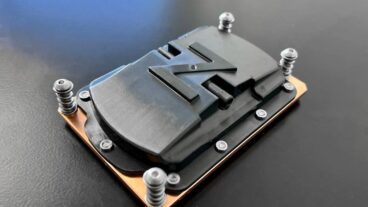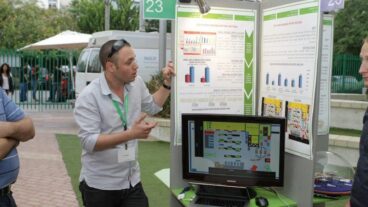In troubled economic times, an organization like BIRD – the Israel-US Binational Industrial Research and Development Foundation, which matches promising Israeli start ups with US partners, is more vital than ever.
Israeli startups have a lot of great ideas, with solid and innovative technology helping to create the products of a high-tech tomorrow. But what they don’t always have is the marketing savvy to bring those ideas to fruition.
That’s where BIRD steps in. BIRD – the Israel-US Binational Industrial Research and Development Foundation, specializes in bringing Israel’s high-tech miracles to the rest of the world, via the world’s (still) most important market, the United States.
BIRD director Dr. Eitan Yudilevich believes that his foundation has never been more necessary than now in the current economic downturn. “Times of crisis bring frustration, pain and disappointment, but they carry also the potential for renewal,” he tells ISRAEL21c. “The hundreds of projects approved and executed are the best testimony to the economic value the foundation brings to both countries.”
The foundation matches Israeli high-tech companies with US partners who help to produce and market a product or service using technology developed by the Israeli companies. BIRD helps to put together a deal between the two sides to make, market and sell a product or service. “We don’t usually fund basic research,” says Yudilevich.
Once the right partner is found, BIRD may also lend a company money to fund projects – thereby boosting not only specific projects and technologies, but also helping to further cement the relationship between the US and Israel.
Up to $8 billion in sales
This has the added bonus of making a significant contribution to the lives of the people affected by the technology in both countries and beyond, which is “reflected in myriads of projects in sectors such as improved networking systems, life sciences, food technology and, of course, the relatively new areas of clean tech and renewable energy,” Yudilevich adds.
Since its 1977 establishment with an endowment (replenished in 1984), BIRD has achieved some impressive results. According to Yudilevich, the foundation has provided loans for eight projects that total about $260 million and have generated between $4 billion and $8 billion in sales.
Investment decisions are made by a board of directors with both US and Israeli representatives, with joint directorship. Eli Opper, the Chief Scientist, is the Israeli chairman, and the US chair is Marc Stanley, Director of the Technology Innovation Program (TIP) at the National Institute of Standards and Technology (NIST).
“Basically, we are looking for three things in our investments,” Yudilevich explains. “A product or service that will be marketed, a good working relationship between the partners, and a logical business plan. If the project meets those criteria, we do our best to fund it – without interest. We don’t ask for IP rights or percentages, just for repayment of the loan, so we can continue to fund more projects.”
Yudilevich adds that nearly all who borrow from BIRD repay their debt on time – usually from the revenue generated when a product is successfully brought to market.
Joint projects that change our lives for the better
It’s clear that BIRD’s clients are at the forefront of new technologies that experts agree will change and improve the way we live. In 2008, BIRD funded dozens of projects in life sciences, energy technologies, clean tech, and homeland security, as well as in communications, electronics, and software.
The projects include: A partnership between Israel’s Applied Cleantech and Massachusetts-based Qteros (formerly SunEthanol) for efficient ethanol production from municipal and agriculture waste sources; a virtual training program for hockey players, developed by Israel’s Applied Cognitive Engineering and USA Hockey; a solar-powered harvesting unit shared between Israel’s SolarEdge and BP Solar International; a system that evaluates liver function for hepatitis and cirrhosis sufferers, developed by Israel’s Exalenz and marketed by pharma giant Pfizer and more.
It is projects like these, which are on the cutting edge of technology, that BIRD is looking to fund, says Yudilevich.
Most often, it’s the US company that takes on the “big brother” role, helping Israeli companies to compete in the American market. At time, however, as was the case with several homeland security projects, it’s the Israeli company that’s bigger and more experienced.
Responding to a strained economy
Despite the foundation’s success, the BIRD endowment has not been replenished since 1984, and in the current climate of low interest rates there is less money to go around – at a time when it’s needed more than ever.
“Unfortunately, because of the economic situation, we are getting more requests for assistance from startups with great ideas, at a time when our own resources are strained,” admits Yudilevich. “Certain areas, like software and communications, will continue to thrive and come through the crisis intact, but more funding is needed for fledgling industries like clean tech and green energy,” because they are more experimental and the return on investment is often slower, he explains.
Yudilevich believes that Israel has the potential to become a powerhouse in these areas. As a result, in a proactive response, BIRD is setting up a special division dedicated specifically to renewable energy projects.
“BIRD Energy will fund US-Israel renewable energy projects, based on additional funding received from the American and Israeli governments. We expect BIRD Energy soon to be formally in place and approve its first joint projects during 2009,” says the BIRD director.
“There are still a lot of great ideas out there,” he adds. “BIRD’s mission is and has been for more than 30 years to support US-Israel industrial cooperation, and we intend to be around for another 30 years.”












